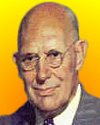 | TODAY IN SCIENCE HISTORY NEWSLETTER - 29 AUGUST |
| Feature for Today |
 Charles Franklin Kettering, born on 29 Aug 1876, accomplished much in the automobile industry while he was vice president and director of research for General Motors Corp (1920-47). He was an American engineer who held 140 patent. Charles Franklin Kettering, born on 29 Aug 1876, accomplished much in the automobile industry while he was vice president and director of research for General Motors Corp (1920-47). He was an American engineer who held 140 patent. Weekly, from September 1942 to July 1945, Kettering gave five-minute intermission talks about Science and Invention during the radio broadcasts of the General Motors Symphony of the Air. These radio talks are a fascinating legacy from the mind of a prolific inventor. The obvious anachronisms now add a historical perspective of the war-time period in which they were written. Among the 59 stories, you should surely find several that interest you, especially those that praise inventions of the era that turned out to be less than beneficial in the long run. This link takes you to the index pages of these Short Stories of Science and Invention from a General Motors booklet of selected talks. Looking through the index, you can choose from the titles of these stories to find those that interst you. Each one is a quick read. |
| Book of the Day | |
|
| Quotations for Today | |
| Science is a first-rate piece of furniture for a man's upper chamber, if he has common sense on the ground floor. But if a man hasn't got plenty of good common sense, the more science he has the worse for his patient. | |
 | An inventor is simply a fellow who doesn't take his education too seriously. You see, from the time a person is six years old until he graduates form college he has to take three or four examinations a year. If he flunks once, he is out. But an inventor is almost always failing. He tries and fails maybe a thousand times. It he succeeds once then he's in. These two things are diametrically opposite. We often say that the biggest job we have is to teach a newly hired employee how to fail intelligently. We have to train him to experiment over and over and to keep on trying and failing until he learns what will work. |
 | Let us suppose the mind to be, as we say, white paper, void of all characters, without any ideas; how comes it to be furnished? Whence comes it by that vast store which the busy and boundless fancy of man has painted on it with an almost endless variety? Whence has it all the materials of reason and knowledge? To this I answer, in one word, from experience. |
| Quiz | |
| Before you look at today's web page, see if you can answer some of these questions about the events that happened on this day. Some of the names are very familiar. Others will likely stump you. Tickle your curiosity with these questions, then check your answers on today's web page. | |
| Births | |
 | Charles F. Kettering, born 29 Aug 1915, was an American engineer whose inventions were instrumental in developing the modern automobile. What is his best-known invention for the automobile? What is his best-known invention for the automobile? |
| Deaths | |
 | Charles Darrow, born 29 Aug 1889, was an American inventor who designed a still well-known board game. His patent titled it a "Board Game Apparatus" and described it as “intended primarily to provide a game of barter.” Can you name this game? Can you name this game? |
| Events | |
On 29 Aug 1982 an atom of a new element was made. It has been given the proposed name of Meitnerium. Physicists at the Heavy Ion Research Laboratory, Darmstadt, West Germany made and identified element 109 by bombing a target of Bi-209 with accelerated nuclei of Fe-58. What is the proposed symbol for this element? What is the proposed symbol for this element? | |
On 29 Aug in 1982, the 52,000-mile “Transglobe” expedition was completed, a first in the circumnavigation of the world What was new about this circumnavigation journey? What was new about this circumnavigation journey? | |
On 29 Aug of a certain year, an astronaut in space held a conversation with an aquanaut in Sealab II below the Pacific Ocean  In what decade did this take place? In what decade did this take place? | |
| Answers |
| When you have your answers ready to all the questions above, you'll find all the information to check them, and more, on the August 29 web page of Today in Science History. Or, try this link first for just the brief answers. Fast answers for the previous newsletter for August 28: computerized axial tomography • birds, to study and to paint for his field guides • Bowie = American; Edgeworth David = Australia; Haug = French; Smith = England and Wales • floating bridge • Scientific American • Worcestershire Sauce. |
| Feedback |
 If you enjoy this newsletter, the website, or wish to offer encouragement or ideas, please send feedback by using your mail reader Reply button. If you enjoy this newsletter, the website, or wish to offer encouragement or ideas, please send feedback by using your mail reader Reply button. |
--
If you do not want to receive any more newsletters, Unsubscribe
To update your preferences and to unsubscribe visit this link


Δεν υπάρχουν σχόλια:
Δημοσίευση σχολίου